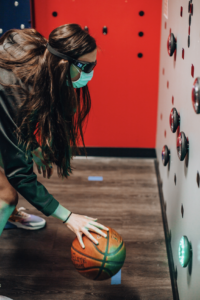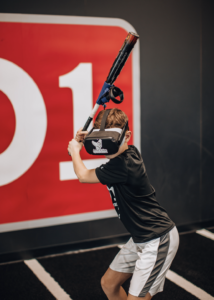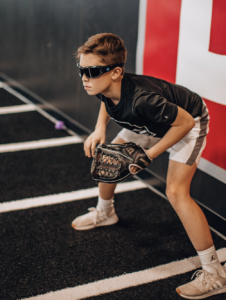A Visual Edge
Ares Elite Sports Vision Helps Athletes Perform at Their Best
Writer / Christy Heitger-Ewing
Photographer / Kerch Creative
 Sports have always been a huge passion for Dr. Joseph LaPlaca of Ares Elite Sports Vision.
Sports have always been a huge passion for Dr. Joseph LaPlaca of Ares Elite Sports Vision.
You name the sport, and I probably played it, he says.
When he was in optometry school, he dreamed of one day opening a sports-based vision service that would help athletes perform at their best. Professors and colleagues, however, dissuaded him, suggesting that such an endeavor couldnt become a full-time business. Following optometry school, LaPlaca joined an optometry practice. Though he enjoyed helping patients, he felt a void.
After working as an optometrist for eight years, my soul was struggling, he says.
He circled back to his original dream and in July of 2018, he launched Ares Elite Sports Vision.
Historically, athletes have great vision, but I felt there was this space between sports and vision, and how the eyes and the brain processed information, that was not being addressed, LaPlaca says.
He felt that by addressing those factors, an athletes performance could be enhanced.
Each client starts with an in-depth evaluation and sports vision examination, which typically takes about one and a half hours. The evaluation, which takes place at the D1 Training facility located inside of Finch Creek Fieldhouse, combines traditional optometry methods with cutting-edge technology. This full sports vision exam includes concussion baselining, because studies show that between 85 and 90% of concussions have a visual component to them, meaning vision or balance is affected.
Knowing where they stand with that information before their season starts helps us if they have a head injury, because we then know where the decrease is from where they were before, and can work on cleaning up that spot, says LaPlaca, who looks at the athletes binocular vision. This includes how eyes move, how pupils react to light, and how eyes track and jump from point to point, in addition to how eyes pick up information that is translated through the brain to different regions.
Next, he studies the patients neurological standing in terms of how their brain processes information, and how fast.
Its a fun exam, LaPlaca says. Were doing virtual-reality stuff, hand-eye coordination stuff, reaction lights, and a reaction board. There are all sorts of things that give me different information to paint a visual neurological picture.
 The first step is figuring out where the problems lie. If there are no problems, the athlete can do in-office training using fixed hoop rings. If there are issues, they can undertake Ares Academy, an at-home online vision platform LaPlaca created that includes traditional vision therapy, plus neurocognitive or brain processing applications to increase the patients capacity to handle drills to improve their visual system.
The first step is figuring out where the problems lie. If there are no problems, the athlete can do in-office training using fixed hoop rings. If there are issues, they can undertake Ares Academy, an at-home online vision platform LaPlaca created that includes traditional vision therapy, plus neurocognitive or brain processing applications to increase the patients capacity to handle drills to improve their visual system.
The difference between traditional optometry and sports vision training is that traditional optometry has an end point, where it takes a certain amount of days to clean up a problem. Thats not the case in sports vision training, where skills vary depending on the sport and the position being played. For instance, a football offensive lineman will differ from a wide receiver – their visual stance is different, so their visual drills need to be different.
Ares Elite Sports Vision attracts both high-functioning athletes who want to improve, as well as 12-year-old athletes who are physically sound but might have an issue that their coach cant identify – this is usually a vision issue.
LaPlaca is always shocked by how many athletes have never had a general eye exam. Annual school screenings dont count, as an athletes visual system is so much more than how clearly they can see a row of letters. Take a baseball player, for instance. If you have a right-handed hitter who is right-eye dominant, and hes facing a right-handed sidearm pitcher, he cant necessarily view the sidearm well without opening his stance up more, because his right eye is his dominant eye.
His peripheral vision is being cut off by his nose so he cant actually see the sidearm coming, so he cant hit that pitch, LaPlaca says. But nobody thinks its a vision issue. They just think that he cant hit that pitch.
LaPlaca can help athletes in all sports, though he finds that the athletes who seek him out the most are baseball players, soccer players and race car drivers, as well as referees.
It makes sense, LaPlaca says of referees. Refs need to see everything as clean and as fast as possible.
LaPlaca, who was chosen to be the official optometrist for this years NCAA Final Four mens basketball tournament, is also excited to have been selected as an expert for Ezone, an esports academy based in Denmark. They are creating a wellness platform for esport athletes, to help push their boundaries and challenge their limits.
Its a population thats spending eight to 10 hours a day in front of their computer, probably hasnt had exams, and likely isnt doing the right things for their eyes because theres a lack of education and understanding as to whats needed in that space, LaPlaca says. Theyre creating a platform for these gamers to go on and use it as a source so they can be healthier.
Recently a college soccer goalie texted LaPlaca to thank him for helping him with his vision. He had just experienced his first career shutout as a Division 1 goalie.
I wouldnt be where I am today without your help, he wrote.
Such comments mean the world to LaPlaca.
I love building relationships with my clientele, LaPlaca says. In general optometry, you see a patient for 10 or 20 minutes and not again until the following year, so theres not that connection of what theyre doing in their life. I dont want to be someone who just cycles through patients. I want to be invested in what theyre doing at school or in their athletic career. Being able to play a small part in how successful they are is super gratifying.
Ares Elite Sports Vision is located at 16289 Boden Road in Noblesville. For more information or to schedule an appointment, call 317-537-7433 or visit areselitesportsvision.com.




